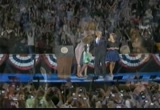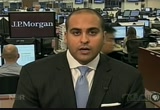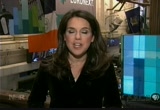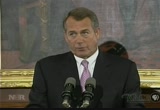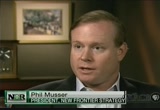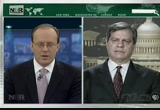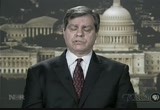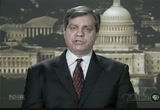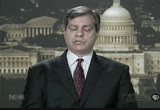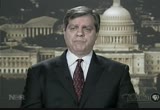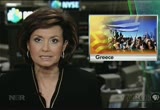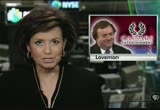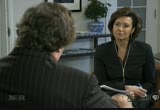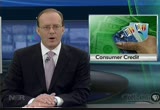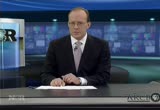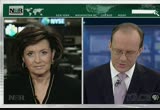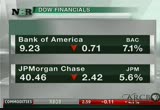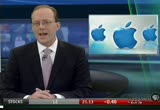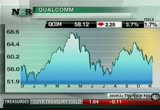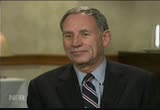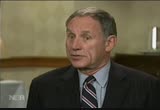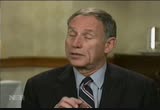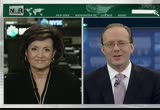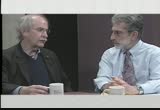tv Nightly Business Report PBS November 7, 2012 4:30pm-5:00pm PST
4:30 pm
>> this is n.b.r. >> susie: good evening everyone. i'm susie gharib. a day after the election a massive selloff on wall street as investors worry about the status quo in washington. >> tom: i'm tom hudson. the election is over but the fiscal cliff, is just eight weeks away, and it will play into every decision the president makes until january first. >> susie: and the fiscal cliff is a big worry for business leaders. the c.e.o. of caesars entertainment, tells us it'll be "very damaging" for his company. >> tom: that and more tonight on "n.b.r."! wall street greeted the election results with a big sell-off in stocks. investors dump shas of almosevertype, giving the
4:31 pm
s&p 500 it's worst day since june. beyond the u.s. elections, europe also brought fresh worries for investors with concerns in greece, and germany. here's how the numbers stacked up on wall street. the dow lost 312 points, at it's worst point of the day, the blue chip index was down 369 points. the nasdaq tumbled nearly 75 points and the s&p 500 off 33. suzanne pratt takes a look at where the market goes from here. >> reporter: let's be candid. this is not the election outcome that wall street wanted to see. after all many investors believe president obama's tax policies will hurt corporate profits. on top of that there's the likelihood of more regulation in the president's second term. those concerns were evident in selling today of energy, banking and healthcare stocks. a quick look at the price board at the new york stock exchange is a good barometer for the worrywarts out there.
4:32 pm
wall street veteran teddy weissberg says many investors are just plain upset. there was an expectation that we would have some change and a change in the policies. and, i think with obama getting re-elected there are a lot of folks that are not happy, and we're kind of seeing that in the stock market. >> reporter: but, others say it's not just the disappointment of romney's loss, it's that the fiscal cliff now looms large on wall street. >> i think the big issue right now is the fiscal cliff, now that the election is behind us everyone is really focusing on what's going to happen at the endf this year, and of course if nothing's done by the end of the year that may very well mean a recession as early as next year. >> reporter: still, the best news for equity investors is that the election was decisive. the next few days or weeks will not be dominated by challenges or hanging chads. instead there is the hope the still divided congress will work together with a reinvigorated
4:33 pm
president to solve america's fiscal problems. and some predict that spirit of cooperation will help lift stocks higher again. >> what i encourage investors to realize however is that an agreement at some point in time is more likely than not and as a result of that you're probably going to see a relief on the other end, the last thing you want to do right now is time the market. >> reporter: here's one hopeful tidbit that might have been lost in all the recent political rhetoric. the stock market is far better off today than it was four years ago. in fact the dow gaining about 60% since president obama's took office in january 2009. suzanne pratt, "n.b.r.," new york. >> susie: in washington today, a lot of talk about e need to get an agreement on the fiscal cliff, and to reach a bi- partisan solution. but as darren gersh reports, both sides are still trying to figure out the message of the election, and may be reluctant to compromise for now.
4:34 pm
>> reporter: the voters have spoken and house speaker john boehner says he has gotten the message. >> because the american people expect us to find common ground, we're willing to accept some additional revenues via tax reform. there's a model for tax reform that supports economic growth. >> reporter: does that mean house republicans are now willing to accept higher taxes on those making more than $250,000? not exactly. boehner says he will only raise more money from taxes under what he called the right conditions. >> does the increased revenue come from government taking a larger share of what the american people earn through higher tax rates? or does it come as a bi-product of growing our economy, energized by a simpler cleaner fairer tax code with fewer loopholes and lower rates for all. >> reporter: democratic senate leader harry reid also says he wants a quick fix for the fiscal cliff. but, he was clearly feeling empowered by a strong showing in the election.
4:35 pm
>> i want to work together, but i want everyone to understand you can't push us around. >> reporter: and raising taxes on the well-off is clearly a top priority. >> all the exit polling, all the polling we've done, the vast majority of the american people support that, including rich people. >> reporter: many republicans see the election as more of a return to the status quo and that will make negotiations on the fiscal cliff tricky. >> the discussion around taxes will have to be calibrated in a way that recognizes that there are certain red lines for both parties that probably will not be crossed. >> reporter: now that the election is over, policy makers are likely to feel more pressure to reach an agreement to ease the fiscal cliff. the public clearly does not like the automatic spending cuts that are set to take place on january first. and polls show many voters don't care for the hard line house republicans took to any agreement that raises any taxes to tame the budget. >> they endanger themselves even further, i think, if they continue to be seen as obstructionist.
4:36 pm
the vast majority of people said, we want people to try to come together and solve our economic problems. so think there is a real danger. the status quo is a danger for them. >> reporter: the statuquo is surely a danger to financial markets. if budget talks fail next year moody's says it will downgrade the country's credit rating. darren gersh, "n.b.r.," washington. >> tom: stuart sweet is president of capitol analysts network. he joins us from our washington d.c. bureau. what do you make of today's stock sell-off? election related? >> so, stew, is what we saw today in the stock market, with the selloff, the reaction to status quo. >> no. i think that is an overstatement. i think it is more of a reaction to what happened in europe, where the e.u. central banker said that germany was not looking so hot. >> so instead of reacting to the election, it was europe in your analysis. let's talk about the economy here, though, with the fiscal clip. youjohn boehner willing to accept new
4:37 pm
revenue. heaharry reid in the senate, saying you can't push u arou anymore. is this language that begins compromise. >> it will begin compromise, but it may be far more horrowing. it may be it takes place next year, rather than this year. the problem is john boehner himself has one as speaker of the house. that does not take place until january 3, 2013. if he cuts a deal with barack obama, he faces a serious revolt in his own caucus. >> tom: is your caution then don't expect a fiscal clip solution before january 3rd? is that what investors to expect? >> the best way out of this impasse for the time being, is gracious gesture for the president-elect, re-elect, president obama, he should offer to extend the tax cuts perhaps until march of next year.
4:38 pm
giving john boehner an opportunity to win his own re-election, and gather some goodwill on the republican side of the aisle. if mr. obama doesn't see it that way, we're in for a rough ride until next january. >> tom: next january is right around the corner for even short-term investors. you're talking about just eight weeks away. >> that's true, but let's not forget what happened with tarp one and tarp two. if we spend eight weeks, through the entire holiday seasons, wrangling about going over the cliff, and moody's keeps on threatening, and we're going to have a recession, and if that's the kind of talk we hear, angry talk in the holiday season, i don't think the markets are going to enjoy that and tre will be a selloff. >> tom: stew, let's talk about the markets because a couple of places you identified to watch that could benefit under the second term for president obama, medicaid, managed
4:39 pm
care, each up about 4%. is the market pricing in booming business with medicaid? >> there is an up side -- i think there probably is. we settled that obamacare will become the law of the land. that means something like 12 million additional costumers for medicaid insurers. you named two companies had had large exposures if that comes through. the only possible side is if they trimmed back medicaid spending as part of this big package that john boehner was talking about. over all, it is a sunny situation. >> tom: speaking of sunny, thanks for the setup, solar fell by 4%. carbon, cleaning up the issns from coal-fired power plants. >> well, all alternative energy relies on tax
4:40 pm
credits, president obama wants to extend these. it is clear from john boehner's comments, he is open to reforming the tax code. we will have a discussion on taxes one way or the other. if president obama wants to extend the alternative energy tax credits, he will probably be able to do so without customarily haggling with boehner. if that happened in president obama's first rm was a gree light given to e.p.a. to become as aggressive as they want to on ozone control. second term, e.p.a. could be quite aggressive. and there are certain compani
262 Views
IN COLLECTIONS
KRCB (PBS) Television Archive
Television Archive  Television Archive News Search Service
Television Archive News Search Service 
Uploaded by TV Archive on

 Live Music Archive
Live Music Archive Librivox Free Audio
Librivox Free Audio Metropolitan Museum
Metropolitan Museum Cleveland Museum of Art
Cleveland Museum of Art Internet Arcade
Internet Arcade Console Living Room
Console Living Room Books to Borrow
Books to Borrow Open Library
Open Library TV News
TV News Understanding 9/11
Understanding 9/11
